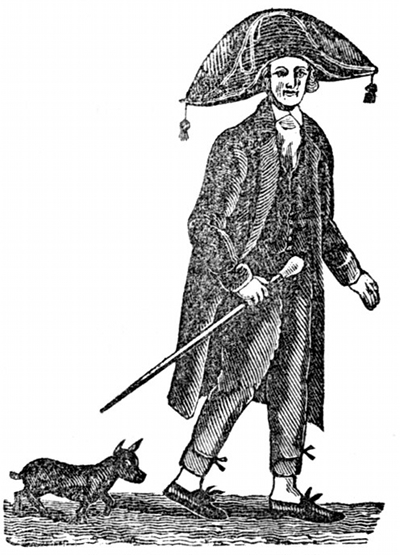BETTER TO BE LUCKY THAN GOOD

“It is better to be lucky than good” is a statement made when we have accomplished something that shouldn’t have succeeded. Very few individuals have embodied the saying more than Timothy Dexter, who despite his god complex, lack of education, and general eccentricity managed to strike gold in many of his monetary, as well as his social, escapades.
Dexter is truly one of the luckiest individuals to have ever walked the Earth.
Born on Oct. 23, 1747, he was not an educated man, having dropped out of school at 8 years old. Working as a leatherworker, he moved to Massachusetts where he would meet Elizabeth Frothingham, an “older” rich widow. At 21, he would marry the 32-year-old and would buy a large mansion.
Dexter ran for mayor of the city of Malden, but lost the race. Frustrated, he repeatedly requested a job and would finally be appointed “Informer of deer”– a trick, of sorts, he eventually realized, since there were few deer seen in the growing city (reportedly not a single one being spotted in the 20 years before the job was later terminated).
Soon the American Revolutionary War began, and the Continental Army began to print its own currency to pay the revolutionary troops and supplies. In a questionable move that even a noneconomist would understand, the Continental Army tried to solve its monetary crunch by printing even more money, causing hyperinflation. Rich aristocrats who wanted the revolution to continue would then occasionally buy some of the worthless cash in exchange for usable ones.
Whereas most aristocrats would only buy in relatively small quantities, Dexter, wanting to show off his wealth in his social circles, would spend nearly all of his money on the inflated Continental Army bills. He would pay pennies for the equivalent of thousands of dollars in Continental currency.
At the end of the Revolutionary War, the U.S. government agreed to pay back each currency at 1% face value. And so, Dexter who had paid for thousands (of dollars) of currency for mere pennies, would amass greater wealth.
Even so, because of his uneducated background Dexter would earn the disdain of the aristocratic “friends” in his social circle. When he wanted to engage in international trade, one of them suggested selling warming pans (pans with long handles to pre-heat one’s bed in chilly times) to buyers in the Caribbean. The advice was deliberately made to financially ruin him, as the pans had little use in the tropical weather.
As it turned out, while the locals did not know how to use the warming pans properly, they were found to make great spoons in the molasses-making process, and would sell out completely – making Dexter even more money.
Now feeling ever more confident, he is said to hear a joke from his friend, who suggested that he should “carry coal to Newcastle” – Newcastle, England, being the primary producer of coal used in the United States. Selling coal in Newcastle would be the equivalent of, say, selling sand at the beach.
Surely, this time his misguided venture would ruin Dexter financially?
No: Just as the coal arrived in Newcastle, there was a worker strike there and the British city, in dire need to fulfill its exportation contracts, quickly purchased all of Dexter’s coal, which made him profitable yet again.
Ever more confident, Dexter would continue to make more business transactions across the world to gain additional wealth.
He exported Bibles to the East Indies (South and Southeast Asia) at a time when Christian missionaries ran out of them while aggressively converting the local population.
He would sell stray cats to the Caribbean region, which was starting to have a rat infestation problem and welcomed his solution.
He accidentally purchased an excess of whalebone, so he decided to ship it to France where the men started to wear corsets for fashion that required whalebone.
Now, to say that after all these financially profitable transactions that Dexter was excessively confident became an understatement, for he now had a god complex.
He hated his wife, and would claim to his guests that his house was haunted by a woman – right in front of her, at the dinner table.
He faked his own funeral to see who would come and cry. Upon seeing his wife not sufficiently cry (understandably), he caned her… in front of the entire assembly.
He once came across a man engraving a statue of John Adams noting his role in writing the Declaration of Independence, instead insisting that he wrote the document (he did not), grabbing his gun and shooting at the engraver until the man changed it.
Beyond all this, perhaps the most famous part of Dexter’s legacy was his book, “A Pickle for the Knowing Ones,” where he complained about politicians, the clergy, and his wife.
An excerpt:
Unto you all mankind Com to my hous to mock and sneare whi ye Dont you Lafe be fore god or I meane your betters think the heir power Dont know thorts and Axsions Now I will tell you good and bad it is Not pelite to Com to see what the bare walls keep of my ground if you are gentel men you would stay Away when all is Dun in marble I expect to goue out myself to Help if thous grat men will send on there Likeness all over the younited States I wish all the printers to give Notis if pleases to in form by printen in the Nouspapers for the good of the holl of man kind
There was not a single punctuation mark throughout the entire book. After receiving so many complaints, Dexter printed a second edition with six pages made up of entirely punctuation marks saying,
“fouder mister printer the Nowing ones complane of my book the fust edition had no stops I put in A Nuf here and thay may peper and solt as they plese”.

Ultimately, his remarkable history was established enough to ensure that, yes, his books sold very well and had eight separate editions. Dexter’s story could be interpreted as confirming the belief that being good at one thing can get one person only so far, and that luck is ultimately the true decider of fate – and that it is, indeed, better to be lucky than good.

Leave a comment